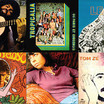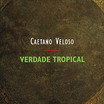Ruídos pulsativos

Geléia Geral
In its original meaning, “anthropophagy” signifies the sacrificial practices common to some tribal societies – some of them found in Brazil’s indigenous societies, for example – consisting of the ingestion of the flesh of enemies taken prisoner in combat, with the aim of absorbing their strength and powers. The expression was used metaphorically by one of the trends in Brazilian modernism, with the meaning of an esthetic-cultural attitude of “devouring” and critical assimilation of foreign cultural values transplanted to Brazil, as well as underlining internal cultural elements and values suppressed by the process of colonization.
“a alegria é a prova dos nove”
Oswald de Andrade

The Manifesto Antropófago (Anthropophagic Manifesto) was published in São Paulo by the modernist Oswald de Andrade, in May, 1928, in the first issue of the “Revista de Antropofagia” (“Anthropophagy Review). Oswaldian anthropophagy should be seen as a creative strategy, whose aim was to question the political-economic-cultural basis imposed by the colonizer on our artistic and intellectual milieu. The anthropophagic claim can be seen as a metaphor for what should be repudiated, assimilated and overcome for the good of the country’s cultural independence.
In dialogs with the European avant-gardes (the “isms”) and the countless manifestos of the time, Oswald was to assume a radically critical posture regarding Brazilian culture. He used parody, jokes, laughter and anarchy to bring about the cultural “cannibalism” of our primitive repressed sources -“Tupy or not Tupy, that is the question” – (a wordplay – Tupy is the largest family of indigenous tribes in Brazil) and of foreign experiences and information. The Oswaldian intention is clear: to digest the information coming from outside and regurgitate a new, finished product that is original, innovative and Brazilian. Nothing to do with “Macumba for tourists”, as Oswald referred to the cultural products that were nothing more than raw materials exported by Brazil. And it is with this same spirit of cultural “cannibalism” and creative autonomy, digesting information as disparate as pop music and samba, that Tropicalism was to produce its songs and leave its mark, in an original way, on the Brazilian cultural scene.






















